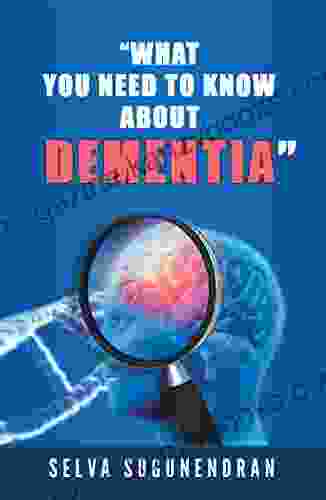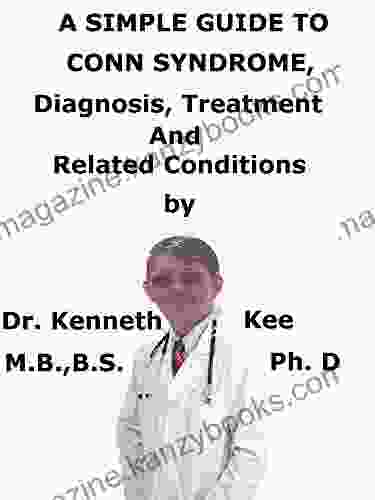Dementia: A Comprehensive Guide

4.5 out of 5
| Language | : | English |
| File size | : | 4690 KB |
| Text-to-Speech | : | Enabled |
| Screen Reader | : | Supported |
| Enhanced typesetting | : | Enabled |
| Print length | : | 282 pages |
What is Dementia?
Dementia is a general term used to describe a group of conditions that affect memory, thinking, and social abilities. It is caused by damage to the brain, and it can range in severity from mild to severe. Dementia is not a normal part of aging, but it is more common in older adults.
Causes of Dementia
There are many different causes of dementia, including:
- Alzheimer's disease
- Vascular dementia
- Lewy body dementia
- Frontotemporal dementia
- Mixed dementia
Alzheimer's disease is the most common cause of dementia, accounting for about 60-80% of cases. It is a progressive disease that damages the brain cells responsible for memory, thinking, and language.
Vascular dementia is the second most common cause of dementia. It is caused by damage to the blood vessels in the brain, which can lead to strokes and other problems.
Lewy body dementia is a type of dementia that is caused by the accumulation of Lewy bodies in the brain. Lewy bodies are abnormal protein deposits that can damage brain cells and lead to problems with movement, thinking, and behavior.
Frontotemporal dementia is a type of dementia that affects the frontal and temporal lobes of the brain. It can cause problems with behavior, personality, and language.
Mixed dementia is a type of dementia that is caused by a combination of two or more of the above causes.
Symptoms of Dementia
The symptoms of dementia can vary depending on the type and severity of the condition. However, some common symptoms include:
- Memory loss
- Difficulty thinking and reasoning
- Problems with language
- Changes in behavior and personality
- Difficulty with daily activities
Memory loss is often one of the first signs of dementia. People with dementia may forget recent events, or they may have difficulty recalling names and faces. They may also become confused about time and place.
Difficulty thinking and reasoning is another common symptom of dementia. People with dementia may have difficulty making decisions, solving problems, or following instructions. They may also become more forgetful and disorganized.
Problems with language can also be a sign of dementia. People with dementia may have difficulty understanding speech, or they may have difficulty finding the right words to say. They may also make mistakes in grammar or pronunciation.
Changes in behavior and personality are also common in dementia. People with dementia may become more withdrawn or irritable. They may also have difficulty controlling their emotions or they may become more impulsive.
Difficulty with daily activities is another common symptom of dementia. People with dementia may have difficulty cooking, cleaning, or managing their finances. They may also have difficulty getting dressed or taking care of their personal hygiene.
Diagnosis of Dementia
There is no single test that can diagnose dementia. However, doctors can use a variety of tests to help them make a diagnosis, including:
- Medical history
- Physical examination
- Neurological examination
- Cognitive tests
- Brain scans
A medical history can help doctors identify any potential risk factors for dementia, such as age, family history, or certain medical conditions. A physical examination can help doctors rule out other conditions that may be causing the symptoms.
A neurological examination can help doctors assess the function of the brain and nervous system. Cognitive tests can help doctors measure memory, thinking, and language skills. Brain scans can help doctors visualize the brain and identify any abnormalities.
Treatment of Dementia
There is no cure for dementia, but there are treatments that can help to slow the progression of the disease and manage the symptoms. Some common treatments for dementia include:
- Medications
- Cognitive stimulation therapy
- Occupational therapy
- Physical therapy
- Speech therapy
Medications can be used to treat the symptoms of dementia, such as memory loss, confusion, and behavioral problems. Cognitive stimulation therapy can help to improve memory and thinking skills. Occupational therapy can help people with dementia to learn how to perform daily activities more easily.
Physical therapy can help to improve mobility and balance. Speech therapy can help people with dementia to communicate more effectively.
Caregiving for Dementia
Caring for a person with dementia can be challenging, but it is also an important way to help them maintain their quality of life. Some tips for caregiving for a person with dementia include:
- Be patient and understanding
- Create a safe and supportive environment
- Help with daily activities
- Encourage social interaction
- Take care of yourself
It is important to be patient and understanding when caring for a person with dementia. They may not always be able to remember things or make sense of what is going on around them. Creating a safe and supportive environment can help to reduce stress and anxiety.
Helping with daily activities can be a great way to support a person with dementia. This may include cooking, cleaning, or bathing. Encouraging social interaction can also be beneficial for people with dementia. It can help them to stay connected with others and maintain a sense of purpose.
Taking care of yourself is also important when caring for a person with dementia. It can be easy to get overwhelmed, so it is important to take breaks and ask for help when you need it.
Dementia is a complex and challenging condition, but it is important to remember that people with dementia are still people. They deserve to be treated with respect and dignity. By understanding dementia and its symptoms, you can help to support people with dementia and their families.
4.5 out of 5
| Language | : | English |
| File size | : | 4690 KB |
| Text-to-Speech | : | Enabled |
| Screen Reader | : | Supported |
| Enhanced typesetting | : | Enabled |
| Print length | : | 282 pages |
Do you want to contribute by writing guest posts on this blog?
Please contact us and send us a resume of previous articles that you have written.
 Book
Book Novel
Novel Page
Page Chapter
Chapter Text
Text Story
Story Genre
Genre Reader
Reader Library
Library Paperback
Paperback E-book
E-book Magazine
Magazine Newspaper
Newspaper Paragraph
Paragraph Sentence
Sentence Bookmark
Bookmark Shelf
Shelf Glossary
Glossary Bibliography
Bibliography Foreword
Foreword Preface
Preface Synopsis
Synopsis Annotation
Annotation Footnote
Footnote Manuscript
Manuscript Scroll
Scroll Codex
Codex Tome
Tome Bestseller
Bestseller Classics
Classics Library card
Library card Narrative
Narrative Biography
Biography Autobiography
Autobiography Memoir
Memoir Reference
Reference Encyclopedia
Encyclopedia Lee Tang
Lee Tang Kelly Santana Banks
Kelly Santana Banks Penny Wolfson
Penny Wolfson Naci Sigler
Naci Sigler Pauline M Camacho
Pauline M Camacho L B Lukas
L B Lukas Kerene Strochnetter
Kerene Strochnetter Roxanne Drury
Roxanne Drury Mark Dejesus
Mark Dejesus Kevin Sherry
Kevin Sherry Maya Feller Ms Rd Cdn
Maya Feller Ms Rd Cdn Trades Union Congress Tuc
Trades Union Congress Tuc Marcella Pixley
Marcella Pixley Lawrence D Longo
Lawrence D Longo Miss Marti Pants
Miss Marti Pants Kesh Patel
Kesh Patel Sheena Smith
Sheena Smith Lisa Tahir
Lisa Tahir Philip Chia
Philip Chia Leonora Tubbs Tisdale
Leonora Tubbs Tisdale
Light bulbAdvertise smarter! Our strategic ad space ensures maximum exposure. Reserve your spot today!
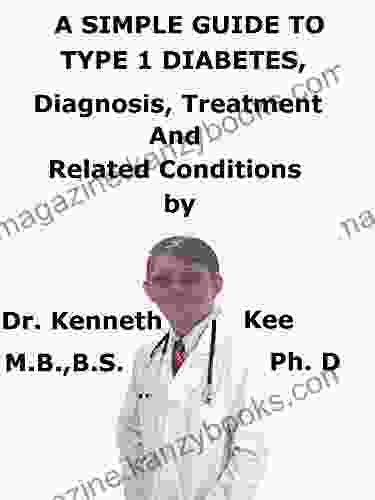
 Chase MorrisMastering Type 2 Diabetes: A Comprehensive Guide to Diagnosis, Treatment, and...
Chase MorrisMastering Type 2 Diabetes: A Comprehensive Guide to Diagnosis, Treatment, and...
 Jermaine PowellThe Food Allergy Mama Baking Book: A Comprehensive Guide to Baking with Food...
Jermaine PowellThe Food Allergy Mama Baking Book: A Comprehensive Guide to Baking with Food... Elton HayesFollow ·16k
Elton HayesFollow ·16k Devin RossFollow ·4.5k
Devin RossFollow ·4.5k Jimmy ButlerFollow ·8.4k
Jimmy ButlerFollow ·8.4k Anton ChekhovFollow ·9.4k
Anton ChekhovFollow ·9.4k Camden MitchellFollow ·9.1k
Camden MitchellFollow ·9.1k Terry PratchettFollow ·15.8k
Terry PratchettFollow ·15.8k Braeden HayesFollow ·12.4k
Braeden HayesFollow ·12.4k Simon MitchellFollow ·16.2k
Simon MitchellFollow ·16.2k

 Ernesto Sabato
Ernesto SabatoLoving Table: Creating Memorable Gatherings
Gatherings...

 Mark Twain
Mark TwainLifestyle After Cancer: The Facts
Cancer is a life-changing...
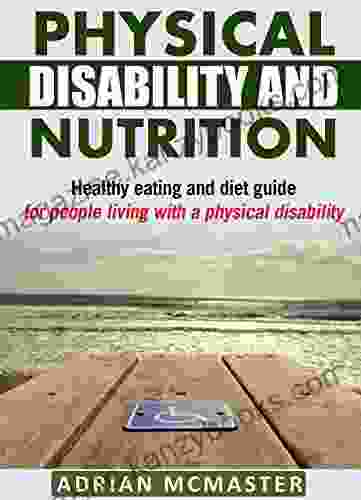
 Keith Cox
Keith CoxUnlocking the Nutritional Needs of Individuals with...
Individuals with physical disabilities...
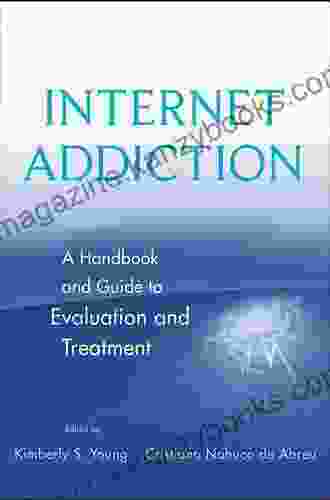
 Rubén Darío
Rubén DaríoHandbook And Guide To Evaluation And Treatment
Empowering Healthcare...

 Andy Hayes
Andy HayesUnveiling the Truth: "Garden Myths" by Robert Pavlis...
The world of gardening is often filled with a...
4.5 out of 5
| Language | : | English |
| File size | : | 4690 KB |
| Text-to-Speech | : | Enabled |
| Screen Reader | : | Supported |
| Enhanced typesetting | : | Enabled |
| Print length | : | 282 pages |


